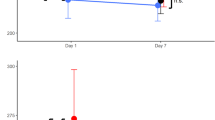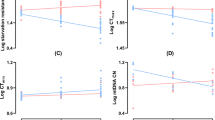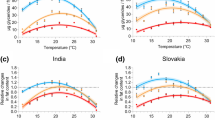Abstract
THE life-span of Drosophila subobscura at 20° C. (the temperature at which this species is normally kept in the laboratory) can be increased by exposing adults to a high temperature soon after their emergence from the pupa. But first the results of keeping adults continuously at the same temperature will be described.
This is a preview of subscription content, access via your institution
Access options
Subscribe to this journal
Receive 51 print issues and online access
$199.00 per year
only $3.90 per issue
Buy this article
- Purchase on Springer Link
- Instant access to full article PDF
Prices may be subject to local taxes which are calculated during checkout
Similar content being viewed by others
References
Alpatov, W. W., and Pearl, R., Amer. Nat., 63, 37 (1929).
Loeb, J., and Northrop, J. H., J. Biol. Chem., 32, 103 (1917).
Maynard Smith, J., J. Exp. Biol., 34, 85 (1957).
Author information
Authors and Affiliations
Rights and permissions
About this article
Cite this article
SMITH, J. Prolongation of the Life of Drosophila subobscura by a Brief Exposure of Adults to a High Temperature. Nature 181, 496–497 (1958). https://doi.org/10.1038/181496a0
Issue Date:
DOI: https://doi.org/10.1038/181496a0
This article is cited by
-
Heat-induced hormesis in longevity is linked to heat-stress sensitivity across laboratory populations from diverse altitude of origin in Drosophila buzzatii
Biogerontology (2024)
-
Sex differences in life history, behavior, and physiology along a slow-fast continuum: a meta-analysis
Behavioral Ecology and Sociobiology (2018)
-
Hormetics: Dietary Triggers of an Adaptive Stress Response
Pharmaceutical Research (2011)
-
Pharmacological intervention in invertebrate aging
AGE (2005)
-
Independence of Temperature of the Rate of Ageing in Drosophila subobscura
Nature (1961)
Comments
By submitting a comment you agree to abide by our Terms and Community Guidelines. If you find something abusive or that does not comply with our terms or guidelines please flag it as inappropriate.



